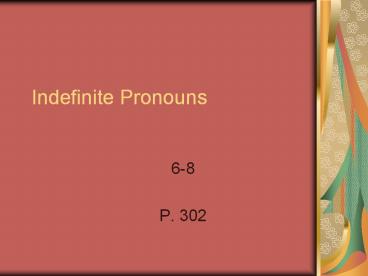Indefinite Pronouns - PowerPoint PPT Presentation
1 / 10
Title:
Indefinite Pronouns
Description:
Indefinite Pronouns 6-8 P. 302 Kinds of Indefinite Pronouns The pronouns someone and everybody do not refer to definite persons or things. Pronouns like these are ... – PowerPoint PPT presentation
Number of Views:258
Avg rating:3.0/5.0
Title: Indefinite Pronouns
1
Indefinite Pronouns
- 6-8
- P. 302
2
Kinds of Indefinite Pronouns
- The pronouns someone and everybody do not refer
to definite persons or things. - Pronouns like these are called indefinite
pronouns they often do not have specific
antecedents.
3
- All, any, most, none, and some can be singular or
plural. These pronouns are plural when they refer
to things that can be counted. - They are singular when they refer to things that
cannot be counted. - Singular- Most of the town closes on the Fourth
of July. - Plural- Most of the stores close on the Fourth of
July.
4
- When words like all, most, or each are used
before nouns, they function as adjectives, not as
indefinite pronouns. - Indefinite Pronouns- Some carried flags in the
parade. - Adjective- Some children carried flags in the
parade.
5
Identify each indefinite pronoun. Is it singular
or plural?
- The days of the Chinese New Year are some of the
most important dates on the calendar. - Each Chinese American community holds its own
celebration. - Everybody crowds into the streets and watches a
parade of paper animals and lanterns. - Everything in the parade is colorful and
exciting, but the best part is the long Golden
Dragon. - This traditional symbol of the Chinese New Year
must be carried by several people.
6
Agreement with Indefinite Pronouns
- You know that when a singular pronoun is the
subject of a sentence, it takes a singular verb,
and a plural pronoun takes a plural verb. When an
indefinite pronoun is the subject of a sentence,
the verb must agree with it. - Everyone enjoys the celebration.
7
- Indefinite pronouns can be antecedents for
personal pronouns. You know that a personal
pronoun must agree with its antecedent in person,
number, and gender.
8
Find the indefinite pronoun and choose the verb
or the pronoun that agrees with it.
- 6. In China most people (celebrates, celebrate)
(its, their) New Years with family reunions and
feasting. - 7. Some of the children (receive, receives) red
envelopes filled with money. - 8. Many (attends, attend) parades with decorated
floats and traditional dances. - 9. In the United States, one usually (spends,
spend) New Years Eve with family or friends. - 10. The two countries celebrate differently, but
each (welcomes, welcome) (its, their) new year
with festivity.
9
Find the indefinite pronoun and choose the verb
or the pronoun that agrees with it.
- 11. Everything at fiestas (begins, begin) before
daylight with fireworks and ringing bells. - 12. Everybody (dances, dance) and (buys, buy)
refreshments. - 13. Some (watches, watch) plays or professional
bullfights, or (he, they) ride merry-go-rounds
and Ferris wheels. - 14. Each of the Mexican cities, towns, and
villages also (holds, hold) (its, their) own
fiesta each year. - 15. In larger towns and cities, many of the
fiestas (resembles, resemble) carnivals or county
fairs in the United States.
10
Find the indefinite pronoun and choose the verb
or the pronoun that agrees with it.
- 16. Few of the fiesta activities (excites,
excite) the children as much as the pinata game. - 17. Most of the children (wonders, wonder) what
each pinata contains. - 18. Everybody (finds, find) the game enjoyable.































